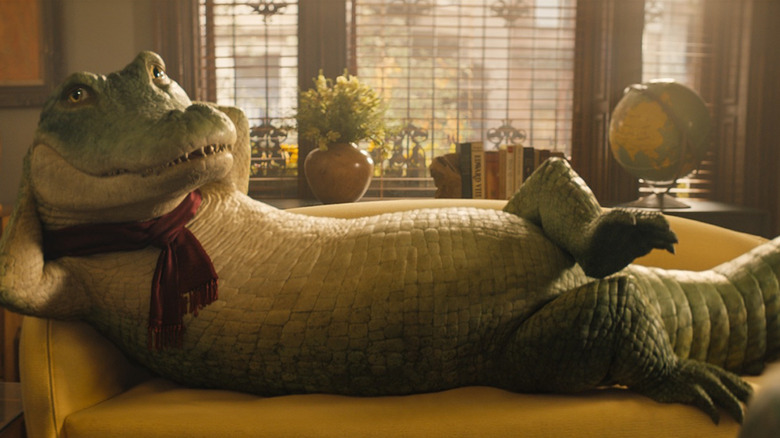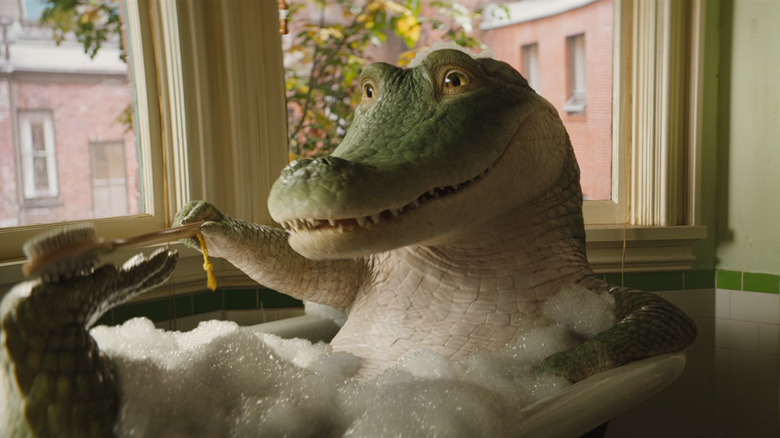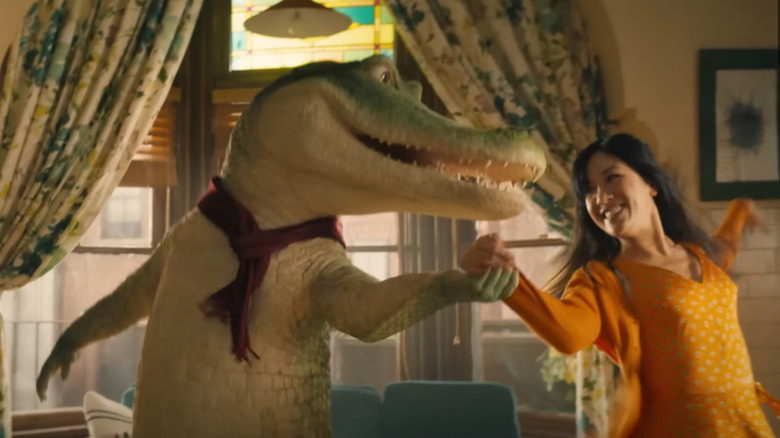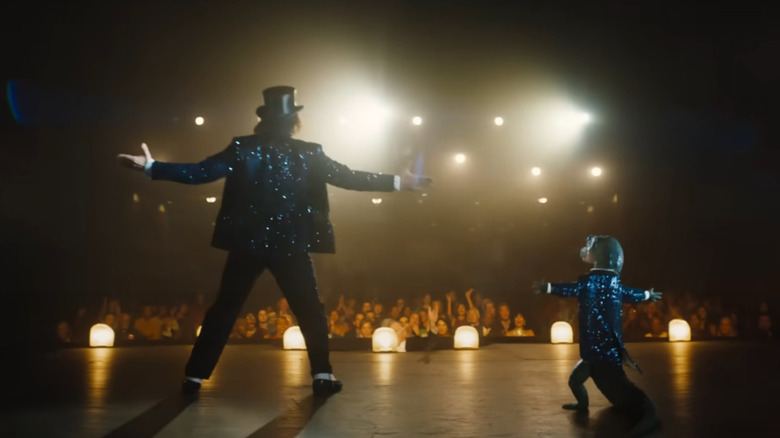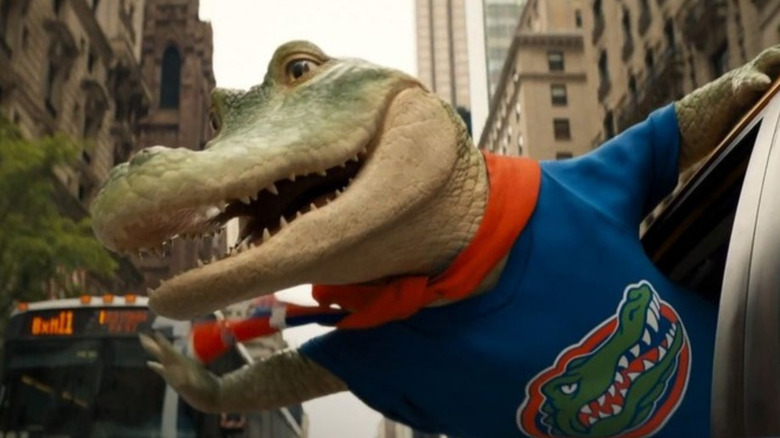Lyle, Lyle, Crocodile Directors On Overhauling The Movie Into A Musical [Exclusive Interview]
It's a bit surprising that Bernard Waber's children's story "Lyle, Lyle, Crocodile" hasn't already been made into a theatrical kids' film. After all, ever since its publication back in 1965, countless children have learned about the power of friendship and good Samaritanism through this friendly crocodile. While there was a straight-to-TV special released in 1987, this timeless tale hadn't been explored or reinvented — until now.
Directors Will Speck and Josh Gordon signed on to direct a new script based on the classic story in 2021, with a screenplay written by William Davies. While the filmmaking duo was mostly known for PG-13 and R-rated comedies, this new production proved that they had the right chops for family entertainment as well. /Film recently spoke with Speck and Gordon to discuss the movie's extensive prep process, as well as what it was like filming elaborate scenes without the show's main star on set.
'Pain is always a good laugh generator'
Note: This interview has been lightly edited for brevity and clarity.
How did you navigate that balance between appropriate humor for kids and jokes that adults can pick up on?
Gordon: There's some things that are just universally comical, and we've dealt with it in the past, which is a lot of physical comedy. I think people love watching characters fumble and fall, so that was an easy one.
Speck: Pain is always a good laugh generator.
Gordon: I think in general, we tried to make a lot of this humor in "Lyle" visual and come from a place of sweetness just so it could address all audiences. I think what we've done in the past a lot of times has been R-rated comedies, and a lot of that's just about pushing the envelope on those ideas. I think [this] was just dialing it back and making sure that we still built off of what we know, which is comedic set pieces, but just do it in a different way.
'We made the choice early on to have an actor play Lyle on set'
That actually ties in really nicely with what I was about to point out, because there is a lot of physical comedy in this film, but the centerpiece of these scenes is CGI. How do you direct your actors around something that actually isn't there?
Speck: This was one of the hardest things in deciding how to execute this film. We wanted the tone of it and the feel of it to feel very grounded and very physically real, and so we made the choice early on to have an actor play Lyle on set so that the other actors could have somebody to react to, and the camera department could have somebody to frame for. It just makes everything feel more real.
We hired a wonderful actor [stunt performer Thomas DuPont] to play him, and after several weeks of shooting in this way, everybody just sort of began to accept this as Lyle. I think it really helped to kind of ground everything. We kept him off set when he wasn't filming so that when he was on set, it was sort of new and a surprise. He wore a prosthetic head and a tail so that he knew where to move in the set and not be physically bumping into things that he couldn't. That really helped us a lot.
''Blades of Glory' was a musical'
Lyle doesn't actually have any lines, and so the only way he communicates is through song. This is also your first musical, so describe the process of learning how to frame a musical compared to one of your other films.
Speck: It's funny. In a lot of ways it plays, "Blades of Glory" was a musical. There were so many sequences that were set to music that sort of required dance, so we'd had some experience with that. We also, over the years, did a lot of commercials. We'd done several large musical commercials, and that was really when we got bitten by the bug.
A friend of ours who had done quite a few of them told us before we made ["Lyle"], "Musicals are really built in the prep, so you really have to make the sequences and then shoot them." So for us, that involved long rehearsals with the actors, long rehearsals with the doubles, and then filming those as rehearsals and then turning those sometimes, because of Lyle being a CG element, into what they call pre-viz so that we were able to actually work through all the kinks. Because a lot of our sets had to be specially built for certain moves. So it was a very complex prep phase for us, and that was really how we were able to bring it to life.
'It's a very efficient narrative storytelling structure'
You worked with [songwriting duo of Benj] Pasek and [Justin] Paul, who are very well known throughout the theater and filmmaking worlds. How did you work with them to ensure that all the songs are narratively and thematically adjacent?
Gordon: We worked with them because they had looked at the script with us. We talked about the story and exactly what character needed to go through what emotional experience as it was happening. They were writing alongside us writing. We were coming up with a story at the same time that they were coming up with these songs and the lyrics and whatnot.
Speck: The script was originally developed as a straightforward movie, and then we decided that it really needed to be a musical. That was when Pasek and Paul came in, and the whole script was kind of recalibrated. It's interesting: In musical theater or in musicals on film, characters can change within the course of a single number. Oftentimes, it's a very efficient narrative storytelling structure, so that was new to us.
'We tried to choose songs that felt classic'
There are also few pre-existing songs in this movie, as well. Were you thinking of these songs as you were directing the movie, or did they just come up naturally?
Gordon: Those came up naturally. I think what we wanted to do was find songs that Lyle could sing that related to all audiences, so your parents and your grandparents could sort of recognize those songs, but that we can introduce them to a new audience for kids. We tried to choose songs that felt classic and from the great American pop songbook. That just naturally led to Stevie Wonder, Elton John, those songs. Then, we did have a couple of [newer] songs. Anthony Ramos did a song that was new and exciting and contemporary, so there's a couple little surprises here and there.
"Lyle, Lyle, Crocodile" arrives in theaters on October 7, 2022.
